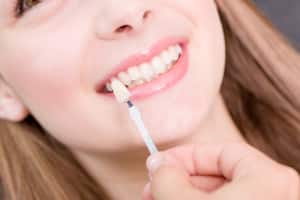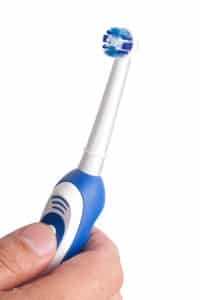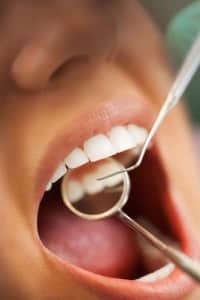 If you’ve ever woken up with a sudden onset of pain in your jaw, you’re probably wondering where it came from. Unless you experienced a facial injury the night before, it’s likely temporomandibular joint disorder, or TMD. TMD is caused from an issue with your jaw joint (the temporomandibular joint), which connects the jawbone to the skull. Unfortunately, there are several factors that contribute to the condition, often making it difficult to diagnose. If you feel pain in your ears or jaw muscles, or hear a popping sound when you open or close your mouth – you’re presenting with common symptoms of TMD. Some patients struggle to even open their mouths sometimes – you’ll want to visit your dentist before it gets any worse. (more…)
If you’ve ever woken up with a sudden onset of pain in your jaw, you’re probably wondering where it came from. Unless you experienced a facial injury the night before, it’s likely temporomandibular joint disorder, or TMD. TMD is caused from an issue with your jaw joint (the temporomandibular joint), which connects the jawbone to the skull. Unfortunately, there are several factors that contribute to the condition, often making it difficult to diagnose. If you feel pain in your ears or jaw muscles, or hear a popping sound when you open or close your mouth – you’re presenting with common symptoms of TMD. Some patients struggle to even open their mouths sometimes – you’ll want to visit your dentist before it gets any worse. (more…)
How Often Do You Floss?
 While you may brush your teeth twice each day – are you really flossing as often as you’re supposed to? The American Dental Association (ADA) recommends flossing your teeth at least one time every day. For some reason, people often struggle to floss this regularly, although it’s a vital part of your oral hygiene. Without flossing, bacteria can build up between your teeth – where it has direct access to your gum tissue. Maintaining your tooth brushing is absolutely essential, but it won’t be able to reach all of the bacteria around your mouth – especially in those hard-to-reach places! (more…)
While you may brush your teeth twice each day – are you really flossing as often as you’re supposed to? The American Dental Association (ADA) recommends flossing your teeth at least one time every day. For some reason, people often struggle to floss this regularly, although it’s a vital part of your oral hygiene. Without flossing, bacteria can build up between your teeth – where it has direct access to your gum tissue. Maintaining your tooth brushing is absolutely essential, but it won’t be able to reach all of the bacteria around your mouth – especially in those hard-to-reach places! (more…)
Stop Snoring: Seek Sleep Apnea Treament
 Are you sick of hearing your partner complain about how loud you snore? You may have tried every nose strip you could find at your local pharmacy, but somehow – you’re still keeping the whole house awake! How is this possible? Your snoring could be stemming from something other than congestion. In fact, if it’s persistently loud, it’s likely a sleep disorder known as, sleep apnea. Since sleep apnea symptoms are generally broad and you experience majority of them while unconscious, the disorder can be extremely difficult to diagnose. A sleep study is the best way to reach a diagnosis, but afterwards, exploring your treatment options may be more complex. (more…)
Are you sick of hearing your partner complain about how loud you snore? You may have tried every nose strip you could find at your local pharmacy, but somehow – you’re still keeping the whole house awake! How is this possible? Your snoring could be stemming from something other than congestion. In fact, if it’s persistently loud, it’s likely a sleep disorder known as, sleep apnea. Since sleep apnea symptoms are generally broad and you experience majority of them while unconscious, the disorder can be extremely difficult to diagnose. A sleep study is the best way to reach a diagnosis, but afterwards, exploring your treatment options may be more complex. (more…)
How Dental Crowns Can Restore Your Teeth
 There are many factors that can damage your teeth – whether it be infections, injuries, or even habits such as grinding or clenching your teeth. Unfortunately, it can be difficult to perform normal daily tasks (such as chewing and speaking) when your teeth are damaged. Depending on the condition of your tooth, your dentist may recommend placing a dental crown to help restore its function and cosmetic appeal. Although they can’t help to completely replace your tooth by themselves, crowns are often used in conjunction with dental implants for a full restoration. (more…)
There are many factors that can damage your teeth – whether it be infections, injuries, or even habits such as grinding or clenching your teeth. Unfortunately, it can be difficult to perform normal daily tasks (such as chewing and speaking) when your teeth are damaged. Depending on the condition of your tooth, your dentist may recommend placing a dental crown to help restore its function and cosmetic appeal. Although they can’t help to completely replace your tooth by themselves, crowns are often used in conjunction with dental implants for a full restoration. (more…)
Should You Get An Electric Toothbrush?
 In order to avoid dental infections like tooth decay and gum disease, you must practice preventive dentistry; excellent oral hygiene, visiting your dentist, and maintaining a healthy diet. Your oral hygiene depends on how (and how often) you brush and floss your teeth at home every day. While you may be used to using a manual toothbrush, an electric toothbrush may be more effective in some cases – especially if you’re prone to bacteria or have suffered from gum disease before. However, not every electric toothbrush is the same, like most manual toothbrushes. One you buy from the grocery store for example, is going to be very different from one you get from your dentist. (more…)
In order to avoid dental infections like tooth decay and gum disease, you must practice preventive dentistry; excellent oral hygiene, visiting your dentist, and maintaining a healthy diet. Your oral hygiene depends on how (and how often) you brush and floss your teeth at home every day. While you may be used to using a manual toothbrush, an electric toothbrush may be more effective in some cases – especially if you’re prone to bacteria or have suffered from gum disease before. However, not every electric toothbrush is the same, like most manual toothbrushes. One you buy from the grocery store for example, is going to be very different from one you get from your dentist. (more…)
The Importance Of Toddler Toothbrushing
 Your oral health can decline well before you even know how to take care of your teeth. It’s up to us as parents to protect our child’s oral health, just as our parents did for us. Getting your toddler to brush their teeth – even when doing it for them – can sometimes seem nearly impossible. Just remember, they only rely on you temporarily to protect their teeth, so don’t give up! Preventing tooth decay (and cavities) begins before your baby’s teeth even poke through their gums. Fortunately, it often becomes easier as they grow, especially when they’re already accustomed to these preventive measures. (more…)
Your oral health can decline well before you even know how to take care of your teeth. It’s up to us as parents to protect our child’s oral health, just as our parents did for us. Getting your toddler to brush their teeth – even when doing it for them – can sometimes seem nearly impossible. Just remember, they only rely on you temporarily to protect their teeth, so don’t give up! Preventing tooth decay (and cavities) begins before your baby’s teeth even poke through their gums. Fortunately, it often becomes easier as they grow, especially when they’re already accustomed to these preventive measures. (more…)
Fight The Fatigue: Diagnosing Sleep Apnea
 You can probably guess why sleep disorders often go undiagnosed – or are misdiagnosed, in many cases. Unless you sleep next to someone, you may be completely unaware of the symptoms occurring throughout your sleep cycle. Unfortunately, the symptoms you are aware of during the day are generally broad and can point to other conditions (like depression). But, if sleep apnea is left untreated for an extended period of time it can lead to further health complications including issues with your heart and liver or even increasing your risk for diabetes. Begin fighting your fatigue by consulting with your dentist – if they suspect you’re suffering from a sleep disorder, a sleep study is likely in your future. (more…)
You can probably guess why sleep disorders often go undiagnosed – or are misdiagnosed, in many cases. Unless you sleep next to someone, you may be completely unaware of the symptoms occurring throughout your sleep cycle. Unfortunately, the symptoms you are aware of during the day are generally broad and can point to other conditions (like depression). But, if sleep apnea is left untreated for an extended period of time it can lead to further health complications including issues with your heart and liver or even increasing your risk for diabetes. Begin fighting your fatigue by consulting with your dentist – if they suspect you’re suffering from a sleep disorder, a sleep study is likely in your future. (more…)
Do You Want To Quit Grinding Your Teeth?
 While grinding or clenching your teeth (bruxism) can become a habit during the day, in most cases it occurs when you’re asleep. For this reason, those who suffer from the condition are typically unaware of its happening. If you sleep with someone, they may hear you grinding throughout the night – but, more often, bruxism causes painful, dull headaches in the morning accompanied by a sore jaw. In severe cases, you may notice damage to your teeth such as; worn enamel, chips, breaks, or even loss altogether. To protect your natural teeth from these dangers, let’s learn how to quit grinding your teeth. (more…)
While grinding or clenching your teeth (bruxism) can become a habit during the day, in most cases it occurs when you’re asleep. For this reason, those who suffer from the condition are typically unaware of its happening. If you sleep with someone, they may hear you grinding throughout the night – but, more often, bruxism causes painful, dull headaches in the morning accompanied by a sore jaw. In severe cases, you may notice damage to your teeth such as; worn enamel, chips, breaks, or even loss altogether. To protect your natural teeth from these dangers, let’s learn how to quit grinding your teeth. (more…)
Dental Fillings: Silver Vs. Composite-Resin
 You may be familiar with dental fillings to help restore teeth that have suffered from cavities – but they can also help with cracks, fractures, or any other surface damage. In some cases, patients who have uneven surfaces may benefit from a dental filling to help smooth out the surface for more efficient biting and chewing. Often, patients worry about the aesthetic appeal of fillings as they were commonly made from silver (amalgam) in previous decades – which looks much darker than your natural tooth. However, now many dentists use a composite resin material that can be shaded to match the color of your surrounding teeth giving you a seamless smile. Depending on the individual and situation, your dentist will help you to determine which material would work best. (more…)
You may be familiar with dental fillings to help restore teeth that have suffered from cavities – but they can also help with cracks, fractures, or any other surface damage. In some cases, patients who have uneven surfaces may benefit from a dental filling to help smooth out the surface for more efficient biting and chewing. Often, patients worry about the aesthetic appeal of fillings as they were commonly made from silver (amalgam) in previous decades – which looks much darker than your natural tooth. However, now many dentists use a composite resin material that can be shaded to match the color of your surrounding teeth giving you a seamless smile. Depending on the individual and situation, your dentist will help you to determine which material would work best. (more…)
Do You Suffer From Bad Breath?
 Do you find yourself embarrassed to talk because you’re afraid your breath smells bad? You’re not alone – many people suffer from chronic bad breath. Often times, it’s caused from an excess amount of bacteria in your mouth – whether it’s on your tongue, gum tissue, or teeth. With severe bad breath, it may be a sign of an infection like gum disease or cavities. However, it can also have more subtle causes like smoking or chewing tobacco, poor diet choices, or even your dentures if they aren’t cleaned regularly. Luckily, you’ve come to the right place – you shouldn’t need to suffer from bad breath. (more…)
Do you find yourself embarrassed to talk because you’re afraid your breath smells bad? You’re not alone – many people suffer from chronic bad breath. Often times, it’s caused from an excess amount of bacteria in your mouth – whether it’s on your tongue, gum tissue, or teeth. With severe bad breath, it may be a sign of an infection like gum disease or cavities. However, it can also have more subtle causes like smoking or chewing tobacco, poor diet choices, or even your dentures if they aren’t cleaned regularly. Luckily, you’ve come to the right place – you shouldn’t need to suffer from bad breath. (more…)







